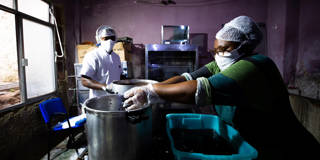Beyond a public-health crisis, the COVID-19 pandemic is an economic and humanitarian crisis – one that is exposing and widening our societies' fault lines. Though addressing systemic inequities is extremely difficult, there are reasons to hope that the pandemic will spur progress toward greater social justice.
NEW HAVEN – Never have the complexities of the relationship between human health and economic wellbeing been more apparent than during the COVID-19 crisis. How can we enforce life-saving social-distancing rules without destroying livelihoods? Why are some groups suffering so much more than others, both clinically and economically? What are those who face lower risks willing to sacrifice for the common good?
With no vaccine or cure for COVID-19, social-distancing protocols, together with mask-wearing and hand washing, quickly emerged as our best defense against the virus. For some industries, the adjustment was relatively straightforward: close down offices and have employees work remotely.
As it turns out, far more work can be done remotely than was previously thought. Physical proximity has long been viewed as essential to the collaboration that is so essential to running a business, let alone innovating. Yet during the pandemic, I finished a joint paper without meeting my co-authors in person; participated in many fruitful online meetings and conferences; and even advised Japanese Prime Minister Shinzo Abe from my home in New England, rather than flying to Tokyo, as I have done in the past.

NEW HAVEN – Never have the complexities of the relationship between human health and economic wellbeing been more apparent than during the COVID-19 crisis. How can we enforce life-saving social-distancing rules without destroying livelihoods? Why are some groups suffering so much more than others, both clinically and economically? What are those who face lower risks willing to sacrifice for the common good?
With no vaccine or cure for COVID-19, social-distancing protocols, together with mask-wearing and hand washing, quickly emerged as our best defense against the virus. For some industries, the adjustment was relatively straightforward: close down offices and have employees work remotely.
As it turns out, far more work can be done remotely than was previously thought. Physical proximity has long been viewed as essential to the collaboration that is so essential to running a business, let alone innovating. Yet during the pandemic, I finished a joint paper without meeting my co-authors in person; participated in many fruitful online meetings and conferences; and even advised Japanese Prime Minister Shinzo Abe from my home in New England, rather than flying to Tokyo, as I have done in the past.